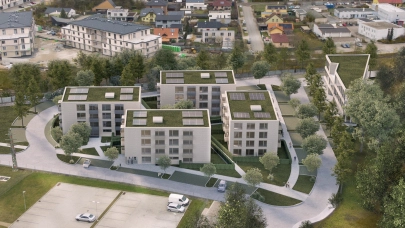
The residential market remains a solid pillar of the real estate development business in Slovakia. However, as the discussion at Bratislava Property Forum 2025 revealed, it is rather sensitive to inflation, changes in interest rates, and government policies impacting affordability and the potential of alternative residential models.
Marián Škvarek, CEO at Realpad and the chair of the panel, opened the discussion by asking about the trends in the demand on the market.
Michal Rehák, Country Managing Director Slovak Republic at Penta Real Estate, highlighted a strong demand in the last quarter of 2024: „It was driven by the upcoming change of VAT at the start of 2025. We still see its continuation in the first quarter of 2025 with around 500 flats to be sold.“
Marek Kalma, Partner at OCCAM Real Estate, admitted that there was still time to be cautious regarding optimistic outlooks. He added that there remained a huge stock of 3390 flats available in Bratislava.
Marián Škvarek then shifted the discussion to the impact of demand and supply on prices, noting that affordability has been a significant issue.
Martin Decký, CEO at BuiltMind, explained that demand is likely to increase, but not uniformly across all segments, with richer people buying larger homes. „If we look at the regional cities in Slovakia, the average wages have been rising at around 4 to 6% per year. However, if you look at the price, they have been growing at around 6 - 7% per year. For an average person, it is way harder to buy a home than it was a year ago,“ he added.
Leszek Trzepla, VP of Sales at Appartme, offered valuable insights into the Polish market, highlighting the growing strength of the rental sector: “Many international players have entered the Polish market. For instance, TAG Immobilien is currently the largest German developer operating here. Additionally, we’re seeing a clear trend of these international investors adopting more advanced technological solutions.”
Karol Bielovský, Investment Director at Dostupný Domov, explained that people were moving towards renting due to affordability and regulatory challenges in obtaining mortgages. Bielovsky also suggested that high prices could impact future generations and change their priorities in favour of easier mobility, especially in Bratislava.
Marián Škvarek then asked about the impact of the post-pandemic world on the supply and design of residential units. Marek Kalma shared his experience in the secondary market, where the clients tended to overprice offered units. Kalma also highlighted observations from regional cities, such as Trenčín or Košice, noting the potential of regions for location-well-oriented developers as this market remained unsaturated and lacked competition.
Regarding the residential design, Michal Rehák added that there's a higher demand for projects with well-designed surroundings and public spaces.
Concerning unit layouts, Martin Decký compared sizes across the region: „A two-room apartment in Poland is around 44 sqm. The investment sector drew the size down. In comparison to Slovakia, it is around 52 sqm.“
Leszek Trzepla highlighted the importance of sustainability and cost-saving measures for developers, with a focus on energy efficiency and home automation. „Young professionals and digital nomads require both modern and smart-living apartments.“
Driven by affordability difficulties, the shift towards rental markets seemed to be an option, suggested Marián Škvarek, sharing his knowledge from discussions in Prague.
Karol Bielovsky mentioned obstacles for owners caused in the rental sector by the impact of government policies and regulations related to families as tenants. Their overprotection limits opportunities in the development of the rental market. Martin Decký shared a similar point of view, adding the aspect of the lengthy permitting process and concluded: „We do believe the government will understand that companies are trying to help people by building homes for them and will take the right steps for the private sector.“



